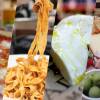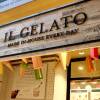When you start to fall in love with Boston, you begin to stumble upon landmarks in corners of the city you think are forgotten. You can’t walk into a Chipotle or grab a steak without stuffing your face in some place where history was made. The same is true of Boston bars: That beer you chugged may have been poured from the same tap as Bulger’s last drink, as Reagan’s famous Boston pint, as a Kennedy’s first beer.
We pick our poison where politicians were poisoned, where writers and artists nursed drinking habits that were the death of them. We stumble out of spots where drunken patrons went missing or met their demise. We’ve sat on barstools discussing Tinder matches where intellectuals waxed poetic about revolution.
We've compiled a short list — complete with an interactive map — of some of Boston’s most historic joints, so you can seek out a drink and feel important doing it. Of course, a couple of these places are no longer in operation so you'll have to settle for scouting out the locale sober, or saddling up at a nearby spot to digest your findings.
For drinkers in Boston, imbibing on some piece of history happens. Now, you’ll at least know it when you do.

Alibi Bar & Lounge: A drunk tank that attracts celebrities
This jail-themed bar inside the Liberty Hotel alludes to the building’s former life: as the Charles Street Jail, a historic granite prison that once held James Michael Curley and Malcolm X. The prison was built in 1851, but by the 1970s, the prison’s horrific conditions induced riots and eventually forced a federal judge to close the facility. The bar opened in the jail’s former “drunk tank,” and serves drinks with cheeky names like Jail Bait and Cool Hand Cuke. Celebrities’ mugshots hang in frames on the walls, with jokey “alibis” (Paris Hilton’s alibi: “Whatever,” her blasé catchphrase) written underneath. Several of the featured celebrities have visited their mug shots at the Alibi, including Mel Gibson and Paris Hilton. “There’s fine line between doing it right and being kind of corny,” says general manager Chris McCabe of the jailhouse theme. The bar is working on updating the mug shots for a younger crowd - Justin Bieber will soon join the ranks.
The Liberty Hotel, 215 Charles St., Boston, 857-241-1144, alibiboston.com
Zanzibar Nightclub (now closed), Boylston Place: Mysterious murder still unsolved
In 1996, Swedish au pair Karina Holmer was partying in a now-closed theater district club before she teetered out. Scott Fayner, alt mag journalist (formerly a freelancer of The Phoenix), was going to walk her out of the bar, but one look away and she was gone. She later disappeared, and eventually turned up near Fenway. Well, half of her did - her body was sliced in half and discarded in a dumpster. “We were thriving, so no one was really questioning anything,” Fayner, a former Zanzibar employee and children’s book author, said about the club. “The whole town was weird after that. Everyone was checking IDs much more, and no one was going out… Something like that was waiting happen.” Twenty years later, no one knows what happened to the 20-year-old. The club reopened under various names, but none have stuck, the space remains empty today.

Storyville Boston: A ‘50s jazz institution, in more places than one
In the mid-20th century, Boston was a jazz hub. In the South End, a few blocks on Massachusetts Avenue became the stomping grounds for icons like Charlie Parker and Duke Ellington. But a little farther north, Back Bay’s Storyville, a subterranean jazz spot that hopped between Kenmore and Copley, brought in acts like Billie Holiday, Charles Mingus and Ella Fitzgerald. The bar lived for years in both the Copley Square Hotel and Hotel Buckminster throughout the fifties, and eventually closed.

A Pizzeria Uno occupies the space where Storyville once stood in Kenmore, but in 2011, restaurateur Brian Lesser reopened Storyville in the Copley location as a speakeasy-themed nightclub. If you want a more authentic jazz institution, visit the South End’s Wally’s, which has hardly changed since its Louis Armstrong days.
Copley Square, 90 Exeter St., Boston, 617-236-1134, storyvilleboston.com
The South End, 427 Massachusetts Ave., Boston, 617-424-1408, wallyscafe.com

Centerfolds & The Glass Slipper: The Combat Zone
In the mid-20th century, the tight one-block alley of Chinatown’s LaGrange Street became a hotbed of the sexy, seedy, and everything in between. Known as the “Combat Zone,” LaGrange was a happening thoroughfare of strip clubs and sex workers that eventually seeped into the rest of Chinatown. The neighborhood exploded with pornographic theaters, adult bookstores, and peepshows. After two Harvard students were robbed and stabbed outside the former Naked-I lounge, the Boston Redevelopment Authority began battle against the Combat Zone, eventually shutting down the majority of the businesses in the area. According to MIT professor and Combat Zone scholar Tunney Lee, several factors induced the area’s demise: “It was declining before the BRA came in. The police were always there, and there were murders before. The place was a zoo… A group of Vietnamese moved into Chinatown, and they started opening stuff up in the Combat Zone. Stores, even a few hotels. These were tough guys, and they had lived through the war, and they needed a place to expand. That could only happen because the combat zone was declining, and that was happening to because of the VHS. Since you could go to the store and buy a VHS [instead of visiting a pornographic theater], you don’t need to go to the Combat Zone.” The two remnants of the area are Centerfolds and The Glass Slipper, two unobtrusive strip clubs that still stand on LaGrange; a far cry from the former Combat Zone.

If you walk down to the corner on Boylston, and you can grab a drink at The Tam, an Irish bar that has seen LaGrange before and after the Combat Zone.
Chinatown, 222 Tremont St, Boston, 617-482-9182, facebook.com/The-Tam
(We aren't about to link to strip clubs on this (mostly) family-friendly site. But hey, if you want to Google it, we're not judging.)
Yvonne’s (pictured above): JFK’s haunt, now a supper club
Before its shutter in 2012, Locke-Ober was the pinnacle of Boston’s fine dining. The dining room in Downtown Crossing hosted presidents and diplomats, from Bill Clinton to Paul Newman. The restaurant first opened in 1875, and had a private dining room set aside for John F. Kennedy. James Beard winner Lydia Shire took over the space in 2001, where she stayed for ten years. And within two years of her departure, the restaurant closed. Owner David Ray blamed slow business and a desire to keep the “dignity” of the historic restaurant intact, he told the Boston Globe.

The space welcomed diners once again last year as Yvonne’s, an intoxicatingly hip supper club frequented by well-dressed financial types, sipping neon-pink champagne juleps sprouting fern-sized stems of mint. JFK is memorialized in a framed portrait near the bar, with a sleeve of tattoos.
Downtown Crossing, 2 Winter Place, Boston, GPS location and separate entrance through alley at 50 Temple Place, 617-267-0047, yvonnesboston.com
Puzzles Lounge (Now Closed): A hate crime, still remembered
Ten years ago, teenager Jacob Robida walked into a popular New Bedford gay bar and began a violent rampage, wielding a hatchet and a gun. After asking the bartender if Puzzles was a “gay bar,” he struck Robert Perry of Dartmouth and Alex Taylor with the hatchet, also shooting Perry. He shot Luis Rosado in the chest, and then fled the scene. Robida later shot himself. The bar is still open, and New Bedford’s Standard-Times released an extensive ten-year anniversary piece in January.
The Eire Pub, Dorchester: Reagan visits, the FBI thwarted?
In 1983, while then-president Ronald Reagan knocked back a beer at the historic Irish pub in Dorchester Center, some government-funded sleuthing was picked up by local papers. Unfortunately, the specific facts were as muddled as some patrons’ memories: The Boston Globe reported that the president unwittingly thwarted an FBI stakeout at the pub, which the bureau denied. Managing editor Matthew V. Stornin claimed in a statement that the goof was a misunderstanding of the facts, “either misunderstood them or was misunderstood by our reporter.” The Eire welcomed their second president, Bill Clinton, with far less drama, but all the fun —just take a look at the photos.
795 Adams St., Dorchester, 617-436-0088, eirepub.com




